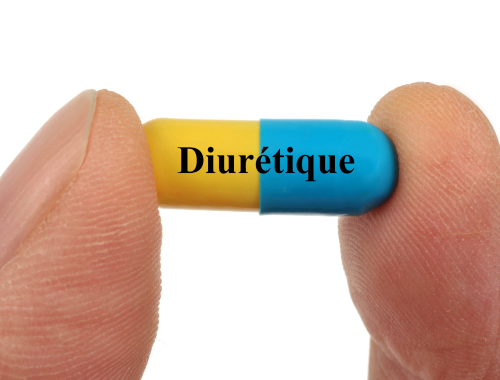Difference Between Diuretics and Antidiuretics
Diuretics, also known as water pills, are medications that transport water and salts out of the body, by increasing diuresis that is urination. Antidiuretics are medications that preserve the water content of the body by reducing urination.

What are diuretics?
Definition:
Diuretics, also known as water pills, are medications that transport water and salts out of the body, by increasing diuresis that is urination.
Origin:
Diuretics are not made in the human body. They are exogenous in nature and are taken once or twice a day religiously for maximum therapeutic effect.
Uses:
Diuretics are used to lower high blood pressure and reduce accumulated fluid in the body. Diuretics are the mainstay of treatment for heart failure, renal failure, and pulmonary edema. These drugs are used to reduce high intraocular pressure and high intracranial pressure.
Examples:
Examples of commonly used diuretics are thiazide diuretics like hydrochlorothiazide and chlorthalidone and loop diuretics like furosemide and bumetanide.
Side effects:
Side effects of diuretics include dizziness, fatigue, hypokalemia, hyponatremia, erectile dysfunction, gout, hyperglycemia, tachycardia, dehydration, and muscle cramps.

What are antidiuretics?
Definition:
Antidiuretics are medications that preserve the water content of the body by reducing urination.
Origin:
Antidiuretics are naturally produced in our bodies. Examples of these are antidiuretic hormone or vasopressin and oxytocin. These hormones can be given exogenously as drugs for various diseases.
Uses:
Antidiuretics are used to treat conditions like diabetes insipidus, abdominal distension, hemorrhagic shock, and gastrointestinal bleeding.
Examples:
Common antidiuretic medications are argipressin, desmopressin, terlipressin, oxytocin, vasopressin, chlorpropamide, and carbamazepine.
Side effects:
Common side effects of antidiuretics are nausea, vomiting, diarrhea, vertigo, pallor skin, hyponatremia, abdominal cramping, chest pain, tremors, tachycardia, pulsating headache, and bronchoconstriction.
Difference between Diuretics and Antidiuretics
Definition:
Diuretics, also known as water pills, are medications that transport water and salts out of the body, by increasing diuresis that is urination. Antidiuretics are medications that preserve the water content of the body by reducing urination.
Origin:
Diuretics are not made in the human body. They are exogenous in nature and are taken once or twice a day religiously for maximum therapeutic effect. Antidiuretics are naturally produced in our bodies. Examples of these are antidiuretic hormone or vasopressin and oxytocin. These hormones can be given exogenously as drugs for various diseases.
Uses:
Diuretics are used to lower high blood pressure and reduce accumulated fluid in the body. Diuretics are the mainstay of treatment for heart failure, renal failure, and pulmonary edema. These drugs are used to reduce high intraocular pressure and high intracranial pressure.
Antidiuretics are used to treat conditions like diabetes insipidus, abdominal distension, hemorrhagic shock, and gastrointestinal bleeding.
Examples:
Examples of commonly used diuretics are thiazide diuretics like hydrochlorothiazide and chlorthalidone and loop diuretics like furosemide and bumetanide. Common antidiuretic medications are argipressin, desmopressin, terlipressin, oxytocin, vasopressin, chlorpropamide, and carbamazepine.
Side effects:
Side effects of diuretics include dizziness, fatigue, hypokalemia, hyponatremia, erectile dysfunction, gout, hyperglycemia, tachycardia, dehydration, and muscle cramps. Common side effects of antidiuretics are nausea, vomiting, diarrhea, vertigo, pallor skin, hyponatremia, abdominal cramping, chest pain, tremors, tachycardia, pulsating headache, and bronchoconstriction.
Table of differences between Diuretics and Antidiuretics

FAQs
What are diuretics and antidiuretics?
Diuretics, also known as water pills, are medications that transport water and salts out of the body, by increasing diuresis that is urination. Antidiuretics are medications that preserve the water content of the body by reducing urination.
What are antidiuretics used for?
Antidiuretics are used to treat conditions like diabetes insipidus, abdominal distension, hemorrhagic shock, and gastrointestinal bleeding.
What is the mechanism of action of antidiuretics?
Antidiuretics increase the reabsorption of water in the kidneys.
What is the definition of a diuretic?
Diuretics, also known as water pills, are medications that transport water and salts out of the body, by increasing diuresis that is urination.
What does a diuretic opposite of an antidiuretic do?
Diuretics transport water and salts out of the body, increasing diuresis, that is urination.
What are the 3 types of diuretics?
Loop diuretics, thiazide diuretics and potassium sparing diuretics.
- Differences Between Reptiles and Amphibians - May 17, 2024
- Difference Between Ophthalmology and Optometry - May 15, 2024
- Difference Between Fear and Anxiety - April 2, 2024
Search DifferenceBetween.net :
Leave a Response
References :
[0]Roush, George C., Ramdeep Kaur, and Michael E. Ernst. "Diuretics: a review and update." Journal of cardiovascular pharmacology and therapeutics 19.1 (2014): 5-13.
[1]Bartter, Frederic C., and William B. Schwartz. "The syndrome of inappropriate secretion of antidiuretic hormone." The American journal of medicine 42.5 (1967): 790-806.
[2]Wile, David. "Diuretics: a review." Annals of clinical biochemistry 49.5 (2012): 419-431.
